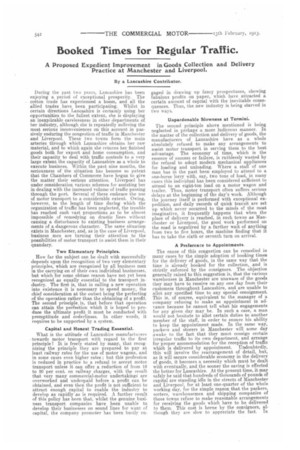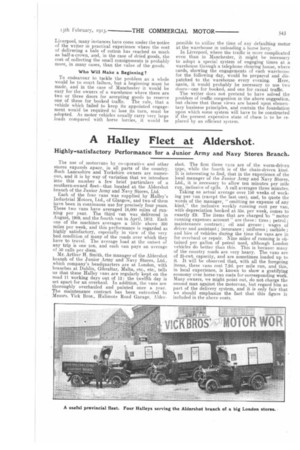Booked Times for Regular Traffic.
Page 28

Page 29

If you've noticed an error in this article please click here to report it so we can fix it.
By a Lancashire Contriautor.
During the past two years, Lancashire has been enjoying a period of exceptional prosperity. The cotton trade has experienced a boom, and all the allied trades have been participating. Whilst in certain directions Lancashire is certainly using her opportunities to the fullest extent, she is displaying an inexplicable carelessness in other departments of her industry, although she is repeatedly suffering the most serious inconveniences on this account in passively enduring the congestion of traffic in Manchester and Liverpool. These two towns form the main arteries through which Lancashire obtains her raw material, and to which again she returns her finished goods both for export and home consumption, and their capacity to deal with traffic controls to a. very large extent the capacity of Lancashire as a, whole to execute business. Within the past nine months, the seriousness of the situation has become so patent that the Chambers of Commerce have begun to give the matter their serious attention. Liverpool has under consideration various schemes for assisting her in dealing with the increased volume of traffic passing through the pert. Several of these embrace the use of motor transport to a considerable extent. Owing, however, to the length of time during which the organization of traffic has been neglected, the trouble has reached such vast proportions as to be almost. impossible of remedying on drastic Tines without causing a disturbance to existing business arrangements of a dangerous character. The same situation exists in Manchester, and, as in the case of Liverpool, business men are turning their attention to the possibilities of motor transport to assist them in their quandary.
Two Elementary Principles.
How far the subject can be dealt with successfully depends upon the recognition of two very elementary principles, which are recognized by all business men in the carrying on of their own individual businesses, but which for some obtuse reason have not. yet been recognized as equally essential to the transport industry. The first is, that in calling a new operation into existence it is necessary to spend money, the chief consideration at the outset being the perfecting of the operation rather than the obtaining of a profit. The second principle, is, that before that operation can attain the perfection which it is hoped to produce the ultimate profit it must be conducted with promptitude and orderliness. In other words, it requires to be supported by a system.
Capital and Honest Trading Essential.
What is the attitude of Lancashire manufacturers • towards motor transport with regard to the first principle I It is freely stated by many, that recognizing the principle they are prepared to pay at least railway rates for the use of motor wagons, and in some cases even higher rates but this profession is reduced in practice to a refusal to accept motor transport unless it can offer a reduction of from 10 to 20 per cent, on railway charges, with the result that very many commercial-motor undertakings; are overworked and underpaid before a profit can be obtained, and even then the profit. is not sufficient to attract enough capital to enable the industry to develop as rapidly as is required. A further result of this policy has been that, whilst. the genuine business transport companies have been unable to develop their businesses on sound lines for want of capital, the company promoter has been busily en gaged in draming up fancy prospectuses, showing fabulous profits on paper, which have attracted a certain amount of capital with the inevitable consequences. Thus, the new industry is being starved in two ways.
Unpardonable Slowness at Termini.
The second principle above mentioned is being neglected in perhaps a more ludicrous manner. In the matter of the collection and delivery of goods, the manufacturers of Lancashire have as a whole absolutely refused to make any arrangements to assist motor transport in serving them to the best advantage. The economy of time, which is the essence of success or failure, is ruthles.sly wasted by the refusal to adopt modern mechanical appliances for loading and unloading. Where a staff of one man has in the past been employed to attend to a one-horse lorry with, say, two tons of load, in many eases this individual has been considered sufficient to attend to an eight-ton load on a motor wagon and trailer. Thus, motor transport often suffers serious delays at the beginning of the day's work. Although the journey itself is performed with exceptional expedition, and daily records of quick transit are set up which never occurred to the minds of the most imaginative, it frequently happens that when the place of delivery is reached, in such towns as Manchester or Liverpool, the good work performed on the road is negatived by a further wart of anything from two to five hours, the machine finding that it has to take the sixth or seventh turn on arrival.
A Preference to Appointments.
The cause of this congestion can be remedied in many cases by the simple adoption of booking times for the delivery of goods, in the same way that the time is already booked for the collection, and is strictly enforced by the consignors. The objection generally raised to this suggestion is, that the various warehouses in Manchester are unaware of the goods they may have to receive on any one day from their customers throughout Lancashire, and are unable to allot any specified time to any special consignment. This is, of course, equivalent to the manager of a company refusing to make an appointment in advance because he cannot tell what his engagements for any given day may be. In such a case, a, man would not hesitate to allot certain duties to another member of the staff, in order to ensure his ability to keep the appointment made. In the same way, packers and storers in Manchester will some day awake to the fact that they must consign certain irregular traffic to its own department, and arrange for proper accommodation for the reception of traffic which is delivered by appointment. Undoubtedly, this will involve the rearrangement of detail, but, as it will secure considerable economy in the delivery of goods, it becomes a necessity which must be dealt with eventually, and the sooner the saving is effected the better for Lancashire. At the present time, it may safely be said that hundreds. of thousands of pounds of capital are standing idle in the streets of Manchester and Liverpool, for at least one-quarter of the whole working day, for the simple reason that the packers, sorters, warehousemen and shipping companies of those towns refuse to make reasonable arrangements for receiving the goods which have to be delivered to them. This cost is borne by the consignors, although they are slow to appreciate the fact. In
Liverpool, many instances have come under the notice of the writer in practical experience where the cost of delivering a bale of cotton has reached as much as half-a-crown, and, in the case of dried goods, the cost of collecting the small consignments is probably more, in many cases, than the value of the goods.
Who Will Make a Beginning?
To endeavour to tackle the problem as a whole would be to court failure, buta beginning must be made, and in the ease of Manchester it would be easy for the owners of a warehouse where there are two or three doors for accepting goods to reserve one of these for booked traffic. The rule, that a vehicle which failed to keep its appointed engagement would be required to lose its turn, must be adopted. As motor vehicles usually carry very huge loads compared with horse lorries,. it would be possible to utilize the time of any defaulting motor at the warehouse in unloading a horse lorry. In Liverpool, where the traffic is more complicated even than in Manchester, it might be necessary to adopt a special system of engaging times at a warehouse through a telephone clearing house, where cards, showing the engagements of each warehouse for the following day, would be prepared and dispatched to the warehouse every evening. Here, again, it would probably be necessary to use two doors—one for booked, and one for casual traffic. The writer does not pretend to have solved the problem of [raffle congestion in the above suggeation, but claims that these views are based upon, elementary business principles, and contain the foundation upon which some system will have to be constructed if the present expensive state of chaos is to be replaced by an efficient system.
































